一般将来时完整版
- 格式:ppt
- 大小:4.06 MB
- 文档页数:22
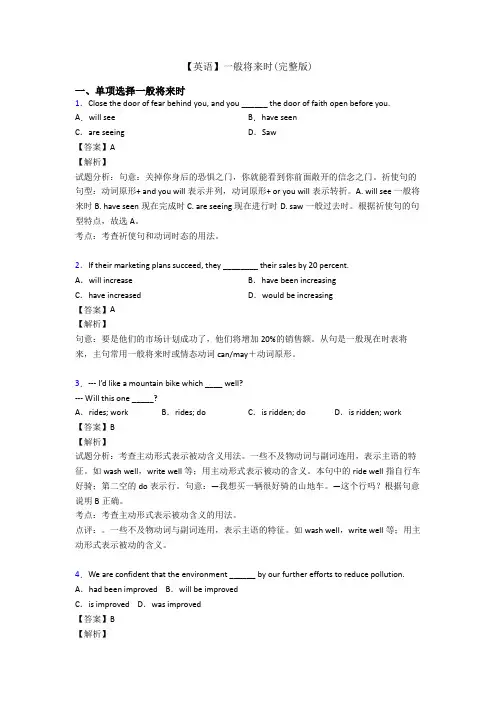
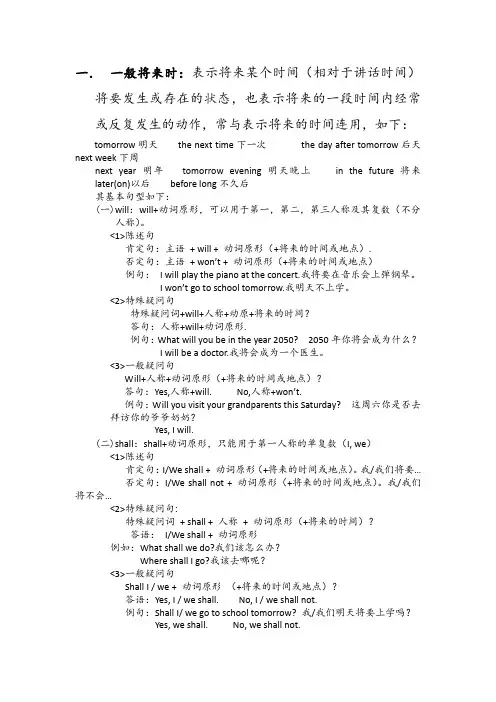
一.一般将来时:表示将来某个时间(相对于讲话时间)将要发生或存在的状态,也表示将来的一段时间内经常或反复发生的动作,常与表示将来的时间连用,如下:tomorrow明天the next time下一次the day after tomorrow后天next week下周next year明年tomorrow evening明天晚上in the future将来later(on)以后before long不久后其基本句型如下:(一)will:will+动词原形,可以用于第一,第二,第三人称及其复数(不分人称)。
<1>陈述句肯定句:主语+ will + 动词原形(+将来的时间或地点).否定句:主语+ won’t + 动词原形(+将来的时间或地点)例句:I will play the piano at the concert.我将要在音乐会上弹钢琴。
I won’t go to school tomorrow.我明天不上学。
<2>特殊疑问句特殊疑问词+will+人称+动原+将来的时间?答句:人称+will+动词原形.例句:What will you be in the year 2050? 2050年你将会成为什么?I will be a doctor.我将会成为一个医生。
<3>一般疑问句Will+人称+动词原形(+将来的时间或地点)?答句:Yes,人称+will. No,人称+won’t.例句:Will you visit your grandparents this Saturday? 这周六你是否去拜访你的爷爷奶奶?Yes, I will.(二)shall:shall+动词原形,只能用于第一人称的单复数(I, we)<1>陈述句肯定句:I/We shall + 动词原形(+将来的时间或地点)。
我/我们将要…否定句:I/We shall not + 动词原形(+将来的时间或地点)。
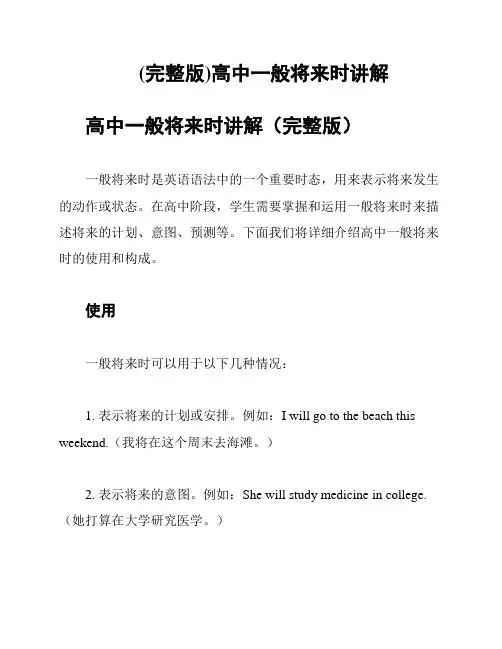
(完整版)高中一般将来时讲解高中一般将来时讲解(完整版)一般将来时是英语语法中的一个重要时态,用来表示将来发生的动作或状态。
在高中阶段,学生需要掌握和运用一般将来时来描述将来的计划、意图、预测等。
下面我们将详细介绍高中一般将来时的使用和构成。
使用一般将来时可以用于以下几种情况:1. 表示将来的计划或安排。
例如:I will go to the beach this weekend.(我将在这个周末去海滩。
)2. 表示将来的意图。
例如:She will study medicine in college.(她打算在大学研究医学。
)3. 表示将来的预测或推测。
例如:It will rain tomorrow.(明天会下雨。
)构成一般将来时的构成非常简单,只需将"will"(shall)加在动词的原形前即可。
例如:I will study.(我将要研究。
)He will go.(他将要去。
)注意事项在使用一般将来时时,还需要注意以下几点:2. 疑问句的构成是将"will"(shall)置于句首。
例如:Will you attend the meeting?(你会参加会议吗?)3. 一般将来时通常不能用于表示固定的时间表或时间表安排,此时应使用其他时态。
例如:The train leaves at 9 a.m.(火车在上午9点离开。
)希望以上内容能够帮助你更好地理解和运用高中一般将来时。
如果还有任何问题,请随时向我提问。
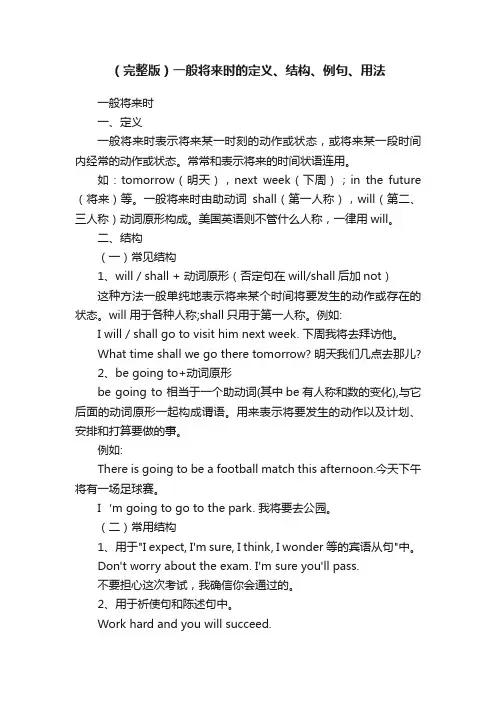
(完整版)一般将来时的定义、结构、例句、用法一般将来时一、定义一般将来时表示将来某一时刻的动作或状态,或将来某一段时间内经常的动作或状态。
常常和表示将来的时间状语连用。
如:tomorrow(明天),next week(下周);in the future (将来)等。
一般将来时由助动词shall(第一人称),will(第二、三人称)动词原形构成。
美国英语则不管什么人称,一律用will。
二、结构(一)常见结构1、will / shall + 动词原形(否定句在will/shall后加not)这种方法一般单纯地表示将来某个时间将要发生的动作或存在的状态。
will用于各种人称;shall只用于第一人称。
例如:I will / shall go to visit him next week. 下周我将去拜访他。
What time shall we go there tomorrow? 明天我们几点去那儿?2、be going to+动词原形be going to 相当于一个助动词(其中be有人称和数的变化),与它后面的动词原形一起构成谓语。
用来表示将要发生的动作以及计划、安排和打算要做的事。
例如:There is going to be a football match this afternoon.今天下午将有一场足球赛。
I‘m going to go to the park. 我将要去公园。
(二)常用结构1、用于"I expect, I'm sure, I think, I wonder等的宾语从句"中。
Don't worry about the exam. I'm sure you'll pass.不要担心这次考试,我确信你会通过的。
2、用于祈使句和陈述句中。
Work hard and you will succeed.如果你努力,就会成功的。
3、与表示时间或条件的状语从句连用。

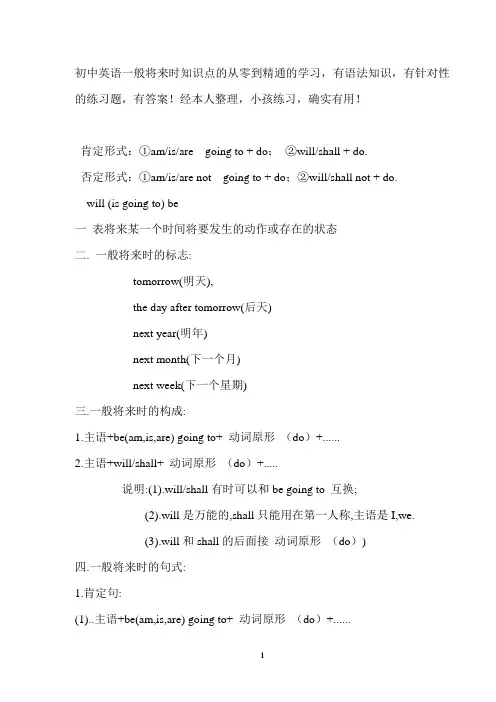
初中英语一般将来时知识点的从零到精通的学习,有语法知识,有针对性的练习题,有答案!经本人整理,小孩练习,确实有用!肯定形式:①am/is/are going to + do;②will/shall + do.否定形式:①am/is/are not going to + do;②will/shall not + do.will (is going to) be一表将来某一个时间将要发生的动作或存在的状态二. 一般将来时的标志:tomorrow(明天),the day after tomorrow(后天)next year(明年)next month(下一个月)next week(下一个星期)三.一般将来时的构成:1.主语+be(am,is,are) going to+ 动词原形(do)+......2.主语+will/shall+ 动词原形(do)+.....说明:(1).will/shall有时可以和be going to 互换;(2).will是万能的,shall只能用在第一人称,主语是I,we.(3).will和shall的后面接动词原形(do))四.一般将来时的句式:1.肯定句:(1)..主语+be(am,is,are) going to+ 动词原形(do)+......(2)..主语+will/shall+ 动词原形(do)+.....2.否定句:(1)..主语+be(am,is,are) not going to+ 动词原形(do)+......(2)..主语+will/shall not+ 动词原形(do)+.....3.一般疑问句:(1).Am/Is,Are+主语+going to+ 动词原形(do)+....(2).Will//shall+主语+ 动词原形(do)+...4.特殊疑问句:(1).What (Where, How...)+be (am,is,are)+主语+ going to + 动词原形(do)+...?(2). What (When,Where,How...) +will/shall+ 主语+ 动词原形(do)+...?二、基本结构:①be going to + do;②will+ do.三、否定句:在be动词(am, is, are)后加not或will后加not成won’t。
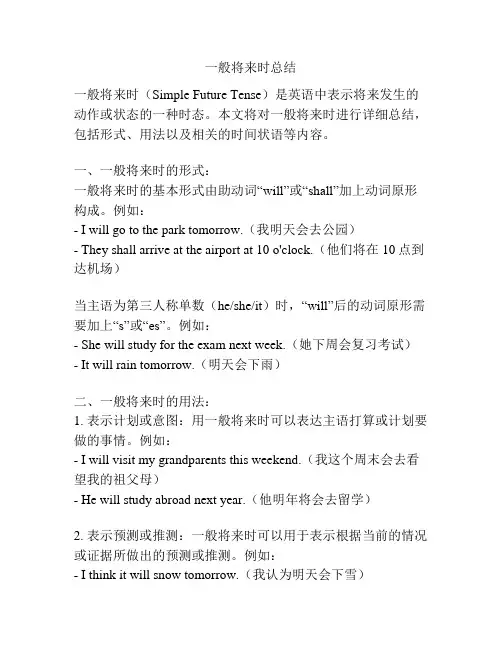
一般将来时总结一般将来时(Simple Future Tense)是英语中表示将来发生的动作或状态的一种时态。
本文将对一般将来时进行详细总结,包括形式、用法以及相关的时间状语等内容。
一、一般将来时的形式:一般将来时的基本形式由助动词“will”或“shall”加上动词原形构成。
例如:- I will go to the park tomorrow.(我明天会去公园)- They shall arrive at the airport at 10 o'clock.(他们将在10点到达机场)当主语为第三人称单数(he/she/it)时,“will”后的动词原形需要加上“s”或“es”。
例如:- She will study for the exam next week.(她下周会复习考试)- It will rain tomorrow.(明天会下雨)二、一般将来时的用法:1. 表示计划或意图:用一般将来时可以表达主语打算或计划要做的事情。
例如:- I will visit my grandparents this weekend.(我这个周末会去看望我的祖父母)- He will study abroad next year.(他明年将会去留学)2. 表示预测或推测:一般将来时可以用于表示根据当前的情况或证据所做出的预测或推测。
例如:- I think it will snow tomorrow.(我认为明天会下雪)- They believe she will win the competition.(他们相信她会赢得比赛)3. 表示意愿或允诺:一般将来时可以表达主语的意愿或承诺要做某事。
例如:- I will help you with your homework.(我会帮你做作业)- He will stop smoking.(他将戒烟)4. 表示预定的事件或安排的计划:一般将来时可以用于表示已经安排好的事件或计划。
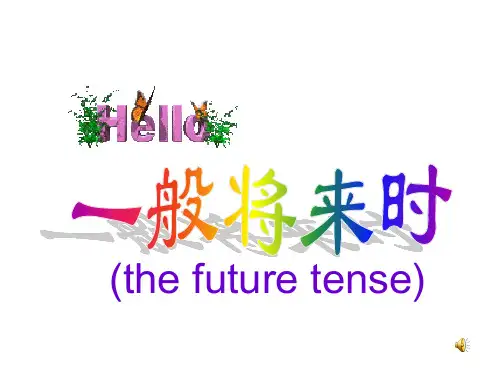
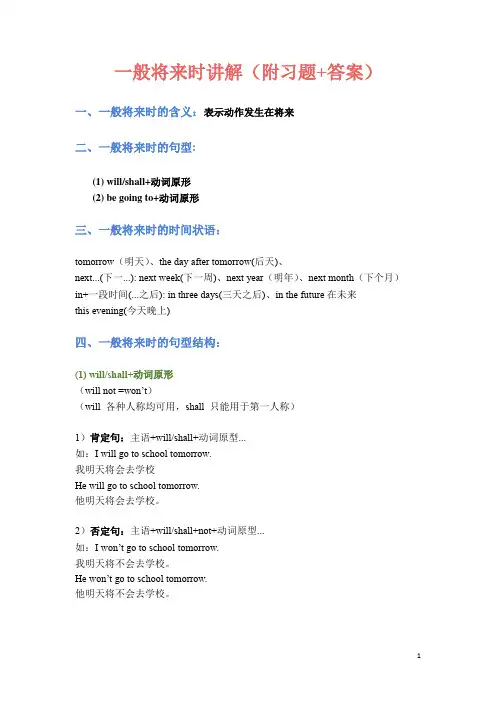
一般将来时讲解(附习题+答案)一、一般将来时的含义:表示动作发生在将来二、一般将来时的句型:(1) will/shall+动词原形(2) be going to+动词原形三、一般将来时的时间状语:tomorrow(明天)、the day after tomorrow(后天)、next...(下一...): next week(下一周)、next year(明年)、next month(下个月)in+一段时间(...之后): in three days(三天之后)、in the future在未来this evening(今天晚上)四、一般将来时的句型结构:(1) will/shall+动词原形(will not =won’t)(will 各种人称均可用,shall 只能用于第一人称)1)肯定句:主语+will/shall+动词原型...如:I will go to school tomorrow.我明天将会去学校He will go to school tomorrow.他明天将会去学校。
2)否定句:主语+will/shall+not+动词原型...如:I won’t go to school tomorrow.我明天将不会去学校。
He won’t go to school tomorrow.他明天将不会去学校。
3)一般疑问句:Will/Shall +主语+动词原型...如:Will you go to school tomorrow?你明天要去学校吗?Will he go to school tomorrow?他明天要去学校吗?肯定回答:Yes, 主语+will.如:Yes, I will.Yes, he will.否定回答:No,主语+will+not.如:No, I won’t.No, he won’t.4) 特殊疑问句:特殊疑问词+will/shall+主语+动词原型...如:What will you do tomorrow?你明天将会做什么?What will he do tomorrow?他明天将会做什么?(2) be going to+动词原形1)肯定句:主语+be going to +动词原型...如:I am going to buy some books tomorrow.我明天打算去买一些书。
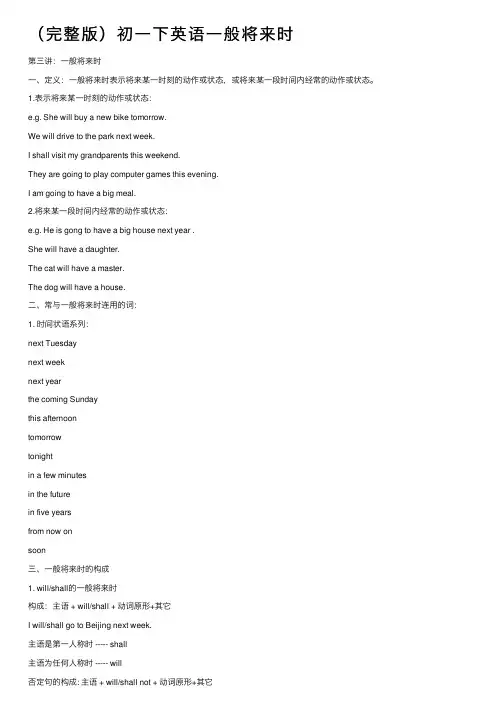
(完整版)初⼀下英语⼀般将来时第三讲:⼀般将来时⼀、定义:⼀般将来时表⽰将来某⼀时刻的动作或状态,或将来某⼀段时间内经常的动作或状态。
1.表⽰将来某⼀时刻的动作或状态:e.g. She will buy a new bike tomorrow.We will drive to the park next week.I shall visit my grandparents this weekend.They are going to play computer games this evening.I am going to have a big meal.2.将来某⼀段时间内经常的动作或状态:e.g. He is gong to have a big house next year .She will have a daughter.The cat will have a master.The dog will have a house.⼆、常与⼀般将来时连⽤的词:1. 时间状语系列:next Tuesdaynext weeknext yearthe coming Sundaythis afternoontomorrowtonightin a few minutesin the futurein five yearsfrom now onsoon三、⼀般将来时的构成1. will/shall的⼀般将来时构成:主语 + will/shall + 动词原形+其它I will/shall go to Beijing next week.主语是第⼀⼈称时 ----- shallwill not = won’tshall not= shan’t【活学活⽤】按照要求改写句⼦1、My teacher will teach us next term.(改为否定句)___________________________________________ 2、I shall not buy new clothes this month.(改为肯定句) ___________________________________________ 3、She is playing computer games.(改为将来时)___________________________________________ 4、We shan't take part in the football match.(改为肯定句) ___________________________________________ 5、I visit my grandparents every weekend.((改为将来时) ___________________________________________ 2. be going to的⼀般将来时构成:主语+ be going to + 动词原形+ 其他She is going to play basketball this afternoon.主语是”I”时 ----- am主语为单数时 ----- is主语为复数及you时 ----- are否定句的构成: 主语 + be not going to + 动词原形+ 其他She is not going to play basketball this afternoon.is not = isn’tam not = ’m notare not = aren’twill或shall与be going to区别:1. will或shall⽤法总结:1)表⽰⼀个将来的动作或状态,“要…,会…”She will go to the park tomorrow.2)表⽰不以⼈的意志为转移的⾃然发展的事。
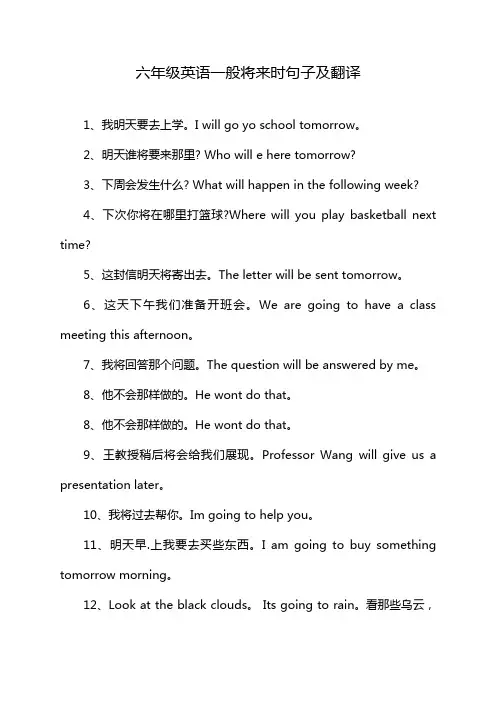
六年级英语一般将来时句子及翻译1、我明天要去上学。
I will go yo school tomorrow。
2、明天谁将要来那里? Who will e here tomorrow?3、下周会发生什么? What will happen in the following week?4、下次你将在哪里打篮球?Where will you play basketball next time?5、这封信明天将寄出去。
The letter will be sent tomorrow。
6、这天下午我们准备开班会。
We are going to have a class meeting this afternoon。
7、我将回答那个问题。
The question will be answered by me。
8、他不会那样做的。
He wont do that。
8、他不会那样做的。
He wont do that。
9、王教授稍后将会给我们展现。
Professor Wang will give us a presentation later。
10、我将过去帮你。
Im going to help you。
11、明天早.上我要去买些东西。
I am going to buy something tomorrow morning。
12、Look at the black clouds。
Its going to rain。
看那些乌云,快要下雨了。
13、我将去买一本书。
Im going to buy a book.14、九月份我将会返校。
I will e back to school in September。
15、你会明白这个问题的。
You will understand the quest ion。
16、明天我要去北京。
I will go to BeiJing tomorrow。
17、她准备这天下午去探望王先生。
She is going to see Mr。
一般将来时一,构成1.肯定句:主+be﹝am/is/are﹞+going to+动词原形+其他。
主+will(shall用于第一人称)+动词原形+其他。
2.否定句:主+be﹝am/is/are﹞+not+going to+动词原形+其他。
主+will/shall+not+动词原形+其他。
3.疑问句:Be﹝am/is/are﹞+主+going to +动词原形+其他?Will/shall+主+动词原形+其他?二,用法:1.(1)表示某一时刻发生的动作或存在的状态或将来某一段时间内经常发生的动作或存在的状态Eg: Iˊll go and see her next Friday.There will be more people in the park.She will go to the night school every other day.We shall go boating every week.(2)当主语是I或We时,问句中一般使用shall,表示征求对方意见,但在美国英语中也用willEg: Shall we have a walk after supper?Where shall we meet tomorrow?2.“be going to+ 动词原形”表示计划,安排,打算做某事,表示已决定的,很可能发生的事,表示某种迹象表明要发生的事。
Eg:-What are you going to do next Sunday?-Iˊm going to listen to music.He is going be a doctor when he grows up.Be careful!The glass is going to break.Look at the clouds.There is going to be a storm.三be going to和will 的区别:1.be going to和shall/will都可以表示意图,但意义上有所区别。
一般将来时的概念和构成概念:一般将来时表示将来某一时刻的动作或状态,或将来某一段时间内经常发生的动作或状态。
构成:(1)will/shall+动词原形(shall用于第一人称I/We,will用于任何人称都可以)(2)be going to+动词原形(be的形式看主语)时间标志:tomorrow明天,the day after tomorrow后天,in the future在将来,next day/week/month/year...明天(下周、下个月、明年);in three days三天后;this afternoon/evening今天下午(今天晚上)等。
例如:I am going to visit the museum tomorrow我打算明天去参观博物馆。
.He will go to the park next week他打算下周去公园。
We shall play football this afternoon今天下午我们打算踢足球。
一般将来时的句式及转换will/shall型(1)肯定式:主语+shall/will+动词原形+其他(2)否定式主语+shall/will +not+动词原形+其他(3)疑问式:Shall/will+主语+动词原形+其他be going to句型(1)肯定式:主语+be going to+动词原形+其他(2)否定式:主语+be+not+going to+动词原形+其他(3)疑问式:be+主语+going to+动词原形+其他“will+动词原形”与“be going to+动词原形”的联系与区别(1)一般情况下它们可以互换He will/is going to visit the Great Wall next week他下周去参观长城。
We will/are going to meet in the zoo at 8 o’clock我们8点钟在动物园门口见面。